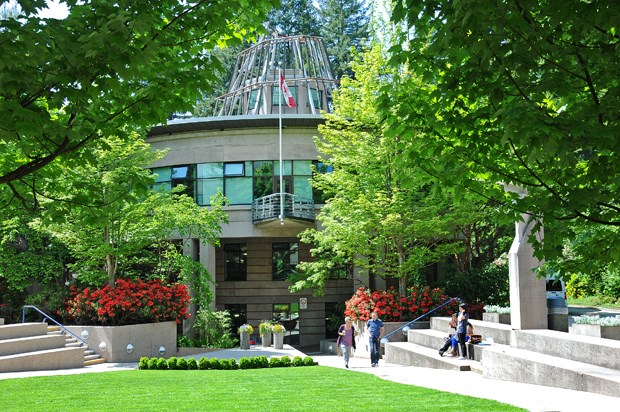For the first time in more than 30 years, Capilano University students starting fall semester aren't represented by the Canadian Federation of Students.
The three-decade relationship ended with an acrimonious split this summer as the university divorced itself from the national federation of student unions.
CapU joined the Canadian Federation of Students ranks in 1981 but the school's student body has grown disenchanted in recent years, viewing the organization as a money pit whose services are
increasingly redundant.
The Capilano Students' Union offers its own health plan, discount program and student agendas - making the national organization largely unnecessary, according to student union president Brittany Barnes.
CapU may pay a little less with another organization, but their ability to lobby could be substantially weaker, according to Canadian Federation of Students internal coordinator Brent Farrington. Besides having a much smaller membership, other student organizations are frequently only able to lobby at one level of government, whereas the national organization has a voice in both federal and provincial politics, Farrington said.
But the cost of national membership turned the national organization into a financial albatross, according to Barnes.
Over a 12-month stretch ending in May 2013, Capilano students paid $104,909 to the Canadian Federation of Students and its provincial arm, according to the Capilano Students' Union. Fees to a similar organization would be slightly more than onefifth the cost, according to Barnes.
CapU's decision to split with the national group and its member student associations across the country was upsetting - particularly as B.C. students face rising tuition fees and cuts to program spending, according to Farrington "I think that you're going to see that a fractured student movement undermines the collective ability to stop these kind of actions," he said. "They believed they could adequately campaign on those issues locally, and I don't believe that's the case at all."
A student petition to sever ties with the national organization garnered signatures from approximately 20 per cent of the student population. The petition eventually led to a March referendum, but the run-up to voting day was rife with challenges, according to Barnes.
"We were met with resistance by the (national organization) at every opportunity they had," she said.
The national group said they did not receive the petition. Barnes said she found that difficult to believe, given it was sent via registered mail.
While on the way to get a court order to force the Canadian Federation of Students to recognize the petition, Barnes was told the national organization had received it.
Each phase of the process that resulted in CapU cleaving itself from the national organization was done in accordance with the bylaws, Farrington said.
During the lead-up to the election, CapU's chief returning officer instituted strict rules on messaging, according to Barnes.
"We had to wear duct tape over our shirts because they didn't agree with some of the things we were saying," Barnes said.
Some of the shirts featured slogans decrying the "outside influence" of the national group, according to Barnes.
Approximately 77 per cent of the 1,405 students who turned up for the March referendum voted to split with the Canadian Federation of Students.
Polling closed at 6 p.m.
and at 6:02 p.m. the student union got an email from the national group stating the referendum was invalid due to improper fee collection, according to Barnes.
There was nothing unusual or untoward in the email, according to Farrington, who said Canadian Federation of Students bylaws state outstanding membership fees must be paid prior to referendum ratification.
The local students group sent a cheque to the national organizatiion and the issue was dropped.
Many schools looking to separate from the Canadian Federation of Students have ended up in court battles, giving the organization a "controversial reputation," according to Barnes.
Both the University of Victoria and the University of Guelph have sparred in court with the national group.
The whole process has left the students' union leery about aligning itself with another student group, according to Barnes.
"We're being very, very careful when it comes to joining another organization," she said.
Both the Canadian Alliance of Student Associations and the Alliance of British Columbia Students are prospects.



